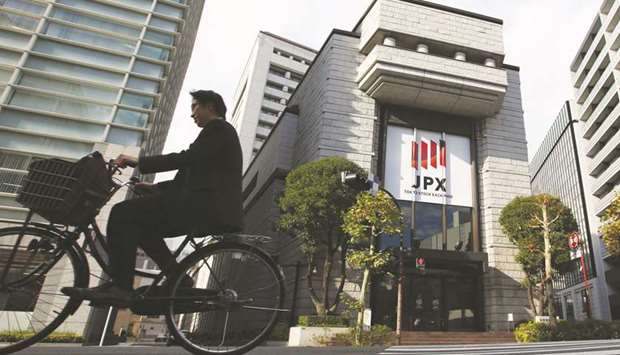Since the start of 2016, foreigners have offloaded some $27bn in the Asian country’s equities.
While they were initially right to sell as the Nikkei 225 fell to a 20-month low in June 2016, they’ve been slow to return, even as the measure trades within 4% short of its highest close since 1996. In fact, a Bank of America Merrill-Lynch survey published this month showed global fund managers cut their allocations to Tokyo shares.
Strategists say overseas investors, who made big profits ploughing money into Japanese equities in Prime Minister Shinzo Abe’s early years, simply took their eye off the ball. They’ve been diverted by markets like Europe, where valuations are attractive and political risk has receded, as far-right candidates lost in French and Dutch elections. For once, Japanese investors are much more optimistic about Japan – pushing two measures of smaller shares to the highest on record.
“Japan doesn’t seem to be foreign investors’ predominant focus,” Shusuke Yamada, chief foreign-exchange and equity strategist at Bank of America Merrill Lynch in Japan, said in a phone interview. “We don’t have big events. It may not be easy for the Japanese market to attract attention.”
The Nikkei 225 has risen 35% from that low in June last year, while the Jasdaq Index and the Tokyo Stock Exchange Second Section gauge of smaller stocks, which are dominated by local investors, both advanced to records this week.
Fundamentals have “aligned,” as Yamada puts it. The economy registered its longest run of growth in a decade and companies are investing more for growth.
Earnings have strengthened, while dividends and buybacks are at records. And the unemployment rate has fallen to the lowest since 1994, spurring bets that the tighter labour market will lead to higher wages and more consumption.
“Profits are at all-time highs, and very comfortably so,” said Nicholas Smith, a strategist at CLSA in Tokyo. “They’re achieving that despite a yen that is substantially stronger than at the peak of the previous cycle. Unless you believe that global growth is going to roll over and go in the tank, which I don’t think is most people’s view at the moment, then probably one of the best places is Japan.”
Merrill’s Yamada says foreigners’ disinterest is itself a reason for optimism: if they do pile in, the rally could really take off.
“I still think the BoJ has been the primary buyer this year,” he said. The central bank has a ¥6tn ($53.9bn) annual purchase target for Tokyo exchange-traded funds. If others increase their buying, there is “scope for an equity rally over the medium term.”
While foreigners added money to Japanese equities for nine weeks through June 2, they did so with less conviction than comparable buying streaks in Abe’s early years. For example, a similar stretch in late 2013 saw ¥4.5tn in purchases, more than twice the recent additions. And despite the strategists’ bullishness, investors themselves still harbour doubts.
“I do believe that economic momentum is strong but not spectacular,” said Akio Yoshino, chief economist at Amundi Japan. “Only a few people believe Japanese economic momentum should build up steam. Most investors including myself feel that that the Japanese economic trend will somehow come to a standstill or plateau.”
Yoshino also pointed to political risks. Prime Minister Abe’s popularity plunged in recent opinion polls as the public questioned his possible intervention in the government’s approval of a school run by one of his close associates.
Still, in the end, it may just be that foreigners were preoccupied with other markets, and missed the positive developments in Japan, according to Jonathan Garner, chief Asia and emerging markets equity strategist at Morgan Stanley in Hong Kong, who is bullish on Tokyo shares.

